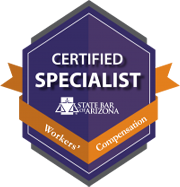Immigrant Workers: Do They Have Workers Compensation too?

IMMIGRANT STATUS, HOW IMPORTANT IS THIS?
If you, as an undocumented immigrant, are hired by an Arizona business to work regular or part-time hours, you are eligible for Worker’s compensation regardless of immigration status. Arizona is one of 13 states, plus Washington, D.C., Puerto Rico, and the Virgin Islands, where workers’ compensation is required for all immigrants.

In Arizona, regardless of immigration status, you are also able to claim workers’ compensation even while working seasonal jobs on Arizona farms. Therefore, it does not matter what status you have as an immigrant worker in the U.S. So long as you work in Arizona, you are eligible for workers’ compensation. In Texas and New Mexico, next door east of Arizona, you are not eligible.
Businesses considered run by a sole proprietor and its partners do not need (or are exempt) to buy insurance for employees and, in the case of small farms, it may be hard to get workers’ compensation benefits after an accident. If you wish to search which employers in Arizona carry workers’ compensation, check out this link here.
WORKERS’ COMPENSATION FOR DOCUMENTED AND UNDOCUMENTED WORKERS
While both documented and undocumented workers in Arizona are eligible for workers’ compensation, it is important to consult (free) with a work accident lawyer or Arizona workers’ compensation attorney to support your case if injured while working on the job. In some cases, the injury may be severe enough that the worker cannot work in their chosen industry again. Therefore, you may need help with negotiating a workers comp settlement that will take care of living expenses and medical bills.
It can be harder for undocumented workers, as opposed to documented workers, in getting workers’ compensation. Some issues that may arise are intimidation from an employer or the insurance company and threatening workers with a loss of work if they file a claim.
It is very important to have an Arizona workers’ compensation attorney looking out for you during this time. Experienced and certified attorneys in Arizona workers’ compensation laws understand fully how to navigate the various roadblocks that may be put in your way. Every case is unique, even if it seems like another case.
There are always differences between two cases besides the fact that it is two different people involved. Never think that your case may not win if you contest a denied claim. Some insurance companies have higher rates of case denials than others which indicates they do not want to pay for the injured worker.
IS WORKER’S COMPENSATION THE SAME AS SOCIAL SECURITY BENEFITS?
Workers’ compensation looks and acts like social security on the surface, except regular social security does not pay for medical bills. Americans must apply for Medicare at the age of 65, regardless of whether they are still working or not, and if working, they still have medical health benefits from their job.
In this ongoing working situation, the medical health benefits pay first for non-work injuries and illnesses. Then Medicare, if the person is 65 and older, steps in to pay the rest of the bills if there are any fees left over.
However, if you have a non-work-related injury severe enough that you cannot work again, you could get social security disability (SSDI) for which you get the highest benefit amount you would get at social security’s full retirement age of 66 years old and older, depending on what year you were born. In many cases, you are also called in to be evaluated by the state insurance doctor for a review of your disabilities.
This is like the workers’ compensation insurer’s medical evaluation that you go through after a work-related injury. After the review is made, the state lets you know whether you will receive your SSDI benefits.
After two years on social security disability benefits, you are automatically put on Medicare health benefits regardless of what age you are, such as 35 years old. For the first two years of social security benefits, you would have to buy your own health insurance to cover medical bills until moved into Medicare health benefits. Workers’ compensation provides medical benefits right from the beginning.
Another difference between workers’ compensation and social security is that if you pass away from work-related injuries, your beneficiaries will receive monthly benefits for a designated amount of time, based on the deceased worker’s monthly benefits. Under social security, your surviving family members may receive $250 in total towards your burial fee.
A spouse, even a divorced spouse (and not remarried), could collect your social security benefits. For example, if your husband got $5,500 a month from social security before passing away, and you, the retired spouse, gets $3,000 monthly, you could switch to your husband’s benefits instead. You cannot claim both your retirement benefits and his at the same time.

CONSULTATION AND PROPER INFORMATION
It is important that you get the right information about your workers’ compensation claim if you are a documented or undocumented immigrant working in Arizona. Always call an Arizona workers’ compensation attorney to find out more about your own situation.
Arizona Injury Law Group offers experienced and Certified workers’ compensation lawyers and legal services for injured workers. Call for your free consultation! 602-346-9009.
Get Help Today
Call Immediately For A Free, No Obligation Consultation And Let Us Help You Put Your Life Back On Track. Let Us Help You
Regain Normalcy And Stability Again. We Want To Help You Get The Benefits You Need And Deserve!


